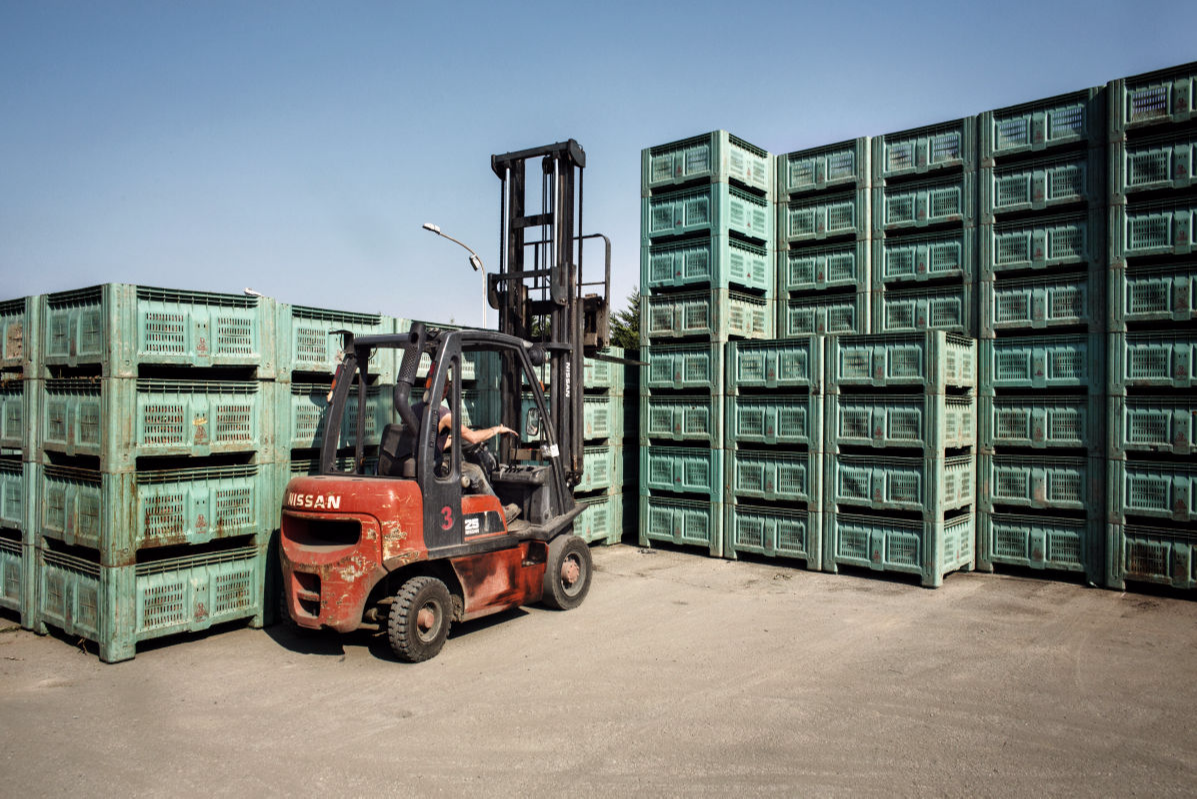
Best Italian tomatoes are hand selected to save their nutritional properties.
The mechanically harvested fresh tomatoes arrive at the plant by trucks (enabled for this specific operation) in plastic bins (agribox) supplied by Assopaf to agricultural producers.
Quantity and quality controls (quality standards, optical residue and determination of the acidity index) are performed. If suitable, tomatoes are stored in a special area, identified by the production batch number, awaiting processing; the data collected are registered by means of a special software to use them for product traceability and re-traceability in compliance with the EC Regulation 178/2002.

Tomatoes are automatically empty into a steel tub filled with water, where the detachment of the soil residues from their surface is carried out. Washing steps are repeated twice with water jets onto motorized rollers to remove brushwood as well as unsuitable tomatoes.
The perfectly washed and intact tomatoes are then carried to the optical sorter where unripened tomatoes and those affected by necrotic parts are discarded.
Suitable tomatoes, under supervision of specialized personnel, are sent to the peeling step carried out with a thermal peeler under vacuum; then tomatoes are transferred to the skin separators (robotized rubber coated rollers) passing through motorized belts, and later to the sorting plans where qualified personnel inspects and eliminates any non-compliant berries and/or skin residues.
Peeled tomatoes, controlled by metal-detector system, are transferred to the volumetric-telescopic filler by merry-go-round. This machine automatically fills the metal cans and when pre-set drained net weight is reached, they are transferred to the “Colmatrice” machine which injects juice under vacuum at 93/95 °C. Finally, cans, are sent to the seamer for their hermetic closure. Tins of peeled tomatoes are transported to the pasteurisation and cooling tunnels. At the exit, they are coded by means of an indelible inkjet print. The coding process, mandatory by law, is very important for traceability and the re-traceability of products and for the technical and diagnostic analysis of the Company.
The pasteurised product is palletized on wooden platforms (pallets) and stored in warehouses. In the post-production period, from October onwards, it will be de-palletized, labelled and packaged and then sent to the Company’s customers.
Chopped and crushed tomatoes production follow the same steps than peeled tomato production until the final inspection of qualified personnel following peeling step
when peeled tomatoes transferred either to the dicer and/or to the “polpatrice” where they are regularly (18x18 pieces) or irregularly cut. Pulp is dejuiced by using a vibrating screen and stored in a stainless-steel tank equipped with a paddle stirrer awaiting to be transferred to the telescopic-volumetric filler by means of a lobe pump. Afterwards the processing replies that of peeled tomatoes.
Tomato purée production follows the same steps than peeled, chopped and crushed tomatoes production until the inspection of the fresh tomato performed by qualified personnel in the sorting phase. Then tomatoes are sent for grinding step performed by a hammer shredder.
The shredded product is collected in a stainless-steel tank and sent to the Hot-Break by means of a mono pump. This machine is very important because in addition to the pasteurization it performs the enzymatic inhibition that influences the final product quality. Further, a centrifugation step by turbo-extractor removes skin and seed residues still present in juice. The refined juice is again heated passing through a pasteuriser and then concentrated by a continuous multiple effect evaporator in a completely automatic and under-vacuum way. When tomato purée reaches pre-set °brix (usually between 8-10 °brix) it is transferred to the telescopic-volumetric filler. Final steps reply those for peeled, chopped and crushed tomatoes.
The productions of the tomato derivatives described are exhaustively represented in the
"flow chart".
Mobirise page software - Go here